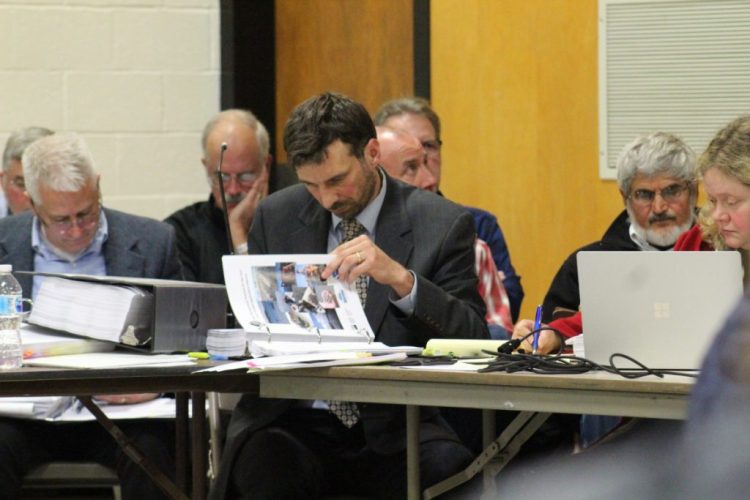BRUNSWICK — The marathon public hearing over Mere Point Oyster Co.’s proposed 40-acre lease on Maquoit Bay will carry over into Monday after nearly four hours of discussion and debate Thursday night. Next week, opponents of the expansion will chime in.
The Department of Marine Resources is holding the hearing to determine if Mere Point Oyster’s proposed expansion, which would increase its annual oyster harvest from about 60,000 to up to 1.5 million in the next three years, meets state requirements. Those include factors like interference on navigation, fishing and other uses, noise and visual impacts among others, many of which Maquoit Bay Preservation Group is concerned about.
Doug Niven and Harbormaster Dan Devereaux own and operate the 26 aquaculture sites that make up Mere Point Oyster. Niven touted oysters as a valuable ecological resource that could add “resiliency along the Brunswick coastline” with their ability to filter water. Their business, if expanded, would allow younger generations to continue working on the water, they said.
The lease application details a 5-acre nursery for up to 2 million seed oysters, a 10-acre intermediate area for oysters in the early to middle stages of growth, and 20 acres for the full-grown oysters and for sinking the cages during the winter months. An additional 5-acre “experimental” area would be used for scallops and quahogs, and would be submerged year-round.
Some people spoke in favor of the lease. Dana Smith, owner of Smith Boatyard, hauls docks and ramps through the bay, often going through the proposed lease site, he said. He didn’t believe the oyster farm operation would interfere with his navigation. People would still be able to kayak, water-ski, jet-ski and pass through the area.
Elizabeth Butler said the lease was an important step in helping to rebuild the bay as a working marine waterfront and provide jobs for the community and the next generation.
A coastal ecologist said she didn’t think there would be substantial impact on eelgrass, but offered recommendations on power-washing the oyster farm’s equipment.
Others expressed their opposition to the scale of the project. Susan Olcott, who said she has worked very closely with Niven and Devereaux over the years, said her concern is that farms of this size could affect coastal communities across Maine if they become the standard. She said smaller-scale aquaculture, which already has community support, would be the more appropriate way to do it.
Attorneys for both sides raised many objections during the testimony, over “baseless” and “irrelevant” questions or over small details. There were so many objections, in fact, that Department of Marine Resources officials had to ask the attorneys to limit their objections as much as possible, because there was a lot to get through in just a short time.
Mere Point Oyster Co. will finish its testimony when the hearing continues at 6 p.m. Monday at Brunswick High School’s Crooker Theatre. At that time, the Maquoit Bay Preservation Group offer its testimony. A second group of intervenors, commercial fishermen, will also testify. If needed, additional hearing dates will be scheduled.
Send questions/comments to the editors.


